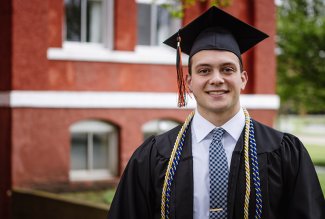
ONU’s Inside Out program prepared Christafer Suarez for his future in law enforcement.
When Ohio Northern University criminal justice major Christafer Suarez, BS '22, received his diploma this spring, it marked the end of the first phase of his professional education. His experiences over the past four years helped shape a vision for his future that includes a position with the New Albany Police Department and enrollment in the Columbus Police Academy this summer. After graduating from the academy, Suarez hopes to earn a master’s degree in criminal justice. It’s a three-part plan intended to culminate with a position in a federal law enforcement agency.
One needs a certain level of assurance to plan so far ahead. Suarez’s experience as a criminal justice student at ONU certainly helped in that regard. The range of experiential learning opportunities made him fully aware of what to expect from a career in law enforcement, none more so than the intense, hands-on, high-impact Inside Out program.
The Inside-Out Prison Exchange Program began in 1997 at Temple University and has grown to include colleges and universities across the United States and internationally. Ohio Northern is one of a handful of Ohio universities that participate in the program, with students traveling off-campus to Allen Oakwood Correctional Facility in Lima, Ohio, to engage with inmates on topics ranging from how the criminal justice system works to the issues former inmates face.
Suarez credits the program with providing him with enhanced understanding of the corrections system within the larger field of criminal justice. Other systems studied in the criminal justice major are the police and the courts, both very relevant to the world of corrections.
“For students, the Inside Out program is a once-in-a-lifetime opportunity to really see the corrections side of the criminal justice system,” says Suarez. “Inmates are brutally honest and so you learn about the good — the numerous work and educational opportunities that are available to inmates, the peer support and drug rehabilitation programs, and also the bad — drug abuse and violence between inmates. But overall, the experience was very professional and positive. The university and prison staff work very hard to make it impactful for both inmates and students.”
Suarez’s work with the program did not change his career plans, but he says those plans are strengthened from the experience, particularly in getting to see the inmates as human beings. He was able to learn the context behind the inmates’ situations — how, and more importantly, why they ended up in prison.
“This experience has taught me to always wonder the ‘why’ of a situation. It is very easy to judge an individual based upon their actions alone. But, when the totality of the situation is explained, you can see the path that the individual followed to their current state. When you hear the backgrounds that some of them have come from, it really opens your eyes to the hardships many of them have faced,” he says.
Suarez is quick to point out that nothing excuses the past behavior that put them behind bars, and society at large may have a hard time applying the adage “never judge a book by its cover” to convicted felons, but Suarez will. Hearing their life stories has strengthened his passion to create positive impacts within the community he’ll eventually patrol as a police officer. He wants to do more than protect and serve, he wants to be a helping hand for people in need of one.
“In my field, I will be expected to communicate with the public professionally and effectively. The public, much like the inmates, come from various backgrounds and have very different life experiences. These life experiences are what separate us and can at times create misconceptions. By immersing ourselves in an environment full of misconceptions, we are able to formulate our own opinions firsthand. Understanding that at the end of the day everyone is a human being and feels emotions the same as you is very powerful,” he says.
Like many of the immersive, high-impact educational experiences ONU students have access to, the Inside Out program teaches students more than just the subject matter. For Suarez, it added context to the lessons he’d studied in the classroom, and offered real-life examples of the rehabilitation process that the corrections system is all about. But, equally as important, it provided him a life experience that he couldn’t have received in any classroom.
“Many of these inmates I worked with had been incarcerated longer than I have been alive,” says Suarez. “The time that has passed paired with the rehabilitation they have undergone has helped to shape them into who they are today. Bettering themselves does not undo their wrongs, but it certainly is a step in the right direction. It was easy to sometimes forget that they were incarcerated for a reason, because you get to know the individual for who they are now, and not who they once were. This will stick with me because it is important to remember that people can change for the better.”